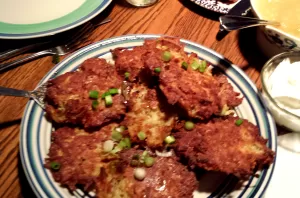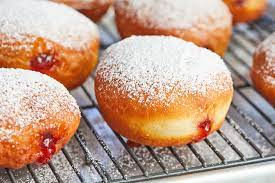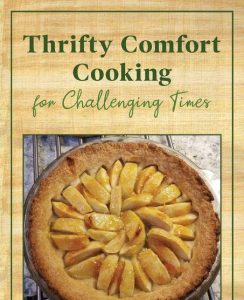By Judith Yamada, The Kitchen Maven
My father was an American born Ashkenazi Jew. Ashkenazi Jews are of central or eastern European descent and have traditionally spoken Yiddish. Dad was bilingual and had lots of friends of varied backgrounds, and family, to chat with in either language.
Not a wealthy or educated man, he was smart and worked hard to support his family, moving us to an inner-city neighborhood of Jewish families. Daddy wanted his family to be safe from those who might hurt us for reasons of irrational hate.
Ours was the neighborhood of Mr. Rogers, with shops of every kind, lovely, hilly tree-lined properties in a community where Jews graduating from the ghetto could live together in harmony without fear of persecution. Daddy couldn’t afford this neighborhood, but he found a way to make it work so we would have quality schools, community, safety and protection.
My bottom line is this; minority groups, especially those historically most suppressed and abused, like the Jews, feel the need to protect themselves from those who would treat them inhumanely. Israeli Jews are no different. They are surrounded, and have gone through history being oppressed, enslaved and slain. One needs to acknowledge and recognize these facts to appreciate their dilemma. Sadly, perpetual hate from all groups affects everyone everywhere. There is so much violence in the world today and, sadly, this is nothing new.
So much pain in the world makes all our celebrations that much more important. And although Chanukah is a relatively minor holiday on the Jewish holiday calendar, it’s a very popular one with Jewish families because it’s about life and light. It doesn’t celebrate war, victory, or destruction, but the miracle of lasting oil that lit the way and saved lives.
The holiday acknowledges the success of Judah Maccabee and his followers over the Syrian King, Antiochus when the king cast the Jews out of their sacred Temple and forbid them to practice their religious rituals.
Then came the miracle of the oil, and the rededication of the Temple. “It’s a tale devoid of armies, but full of divine intervention when just enough oil for one day lasted for eight.”
A time for decorating homes and preparing special foods, like potato latkes and sufganiyot (filled donuts), Chanukah lasts eight days, beginning at sundown on the Hebrew calendar date 25 Kislev and ending at sundown eight days later. This year (2023) the holiday begins on December 7 and concludes on December 15.
Annually, on each night of Chanukah, Jews light a menorah/hanukkiah to commemorate the rededication of the Temple of Jerusalem in 164 B.C.E. The menorah is a candelabrum with nine branches for its flames. One candle is lit on the first night and an additional flame is lit, each night thereafter, for eight nights until all branches of the menorah are lit. It is traditional to place the menorah in a window for all to see.
On the eighth night of Chanukah, all the branches glow brilliantly in celebration. Families sit back to watch the luminous display, exchange nightly gifts, listen to music, dance, play games with dreidels (decorated tops), and enjoy holiday treats.
The key to cooking at Chanukah is the oil. The miracle of the oil is a story Jewish children learn at an early age, regarding the wonder of Chanukah. If you’ve ever enjoyed a potato pancake or a warm jelly filled donut, you’ll appreciate traditional Chanukah cuisine. It’s Jewish soul food.
Happy Chanukah! Peace and love to all.
SHELLEY’S POTATO LATKES
 10 medium russet potatoes
10 medium russet potatoes
1 small onion
8 large eggs
1 cup unsalted matzo meal
1 Tablespoon salt
Pepper to taste
Vegetable oil for frying
Peel the potatoes and shred by hand on the large holes of a hand grater. Soak the shredded potatoes in cold water. Into a medium-large bowl, finely grate the onion on the fine side of the grater. Rinse and drain the shredded potatoes; add them to the bowl with the onion. With a fork, mix in the egg, matzo meal, salt and pepper. Heat ¼ inch oil in a large heavy skillet on medium to medium-high heat. When the oil is hot, spoon pancake sized portions of the mixture into the pan. Fry until golden brown, turning once. Serve with sour cream and applesauce on the side. Yields about 30 large pancakes.
SUFGANIYOT (Israeli Jelly Donuts)
 2 envelopes active dry yeast
2 envelopes active dry yeast
¼ cup warm water (105-110 degrees F)
¾ cup milk
½ cup butter
½ cup sugar
1 Tablespoon salt
2 large eggs
1 teaspoon grated lemon zest (yellow only)
7 to 8 cups all-purpose flour
Vegetable oil for deep-frying
Raspberry, apricot or cherry jelly
Powdered sugar
Dissolve the yeast in the warm water; set aside. Heat the milk with the butter over medium-low heat until the milk is scalded (small bubbles form around edge of pan). Add the sugar and salt and stir to dissolve; cool to lukewarm. Beat the eggs lightly; add the lukewarm milk mixture with the lemon and the yeast mixture. Gradually add 7 cups of flour, beating with a wooden spoon or mixer dough hook until smooth and elastic. Add more flour, if necessary, to make a soft dough that is easy to handle.
Grease a bowl about twice as large as the dough and turn the dough in the bowl to lightly grease it all over. Cover loosely with wax paper or a clean linen dish towel. Put in a warm place until doubled in bulk. When ready, shape dough into balls the size of a walnut. Cover and let rise for 30 minutes.
Heat the oil to 375 degrees F. in an electric deep-fryer or in a heavy pan on top of the stove. Drop the balls of dough in carefully and fry until browned, turning once. Lift donuts from the oil with tongs or a slotted spoon and place them on paper towels to drain. Make a slit on the side of each donut and fill with jelly immediately. Sprinkle with powdered sugar just before serving.
https://www.facebook.com/Creativepenandpantry/
 Many recipes in my posts are found in my cookbook, “Thrifty Comfort Cooking for Challenging Times”. The book is available through Amazon.com and Barnes & Noble.com. All (100%) of author royalties from retail sales of my cookbook go directly to the Oregon Food Bank, Tillamook Services, to assist families and individuals experiencing food insecurity. Purchasing the cookbook will benefit not only the recipient of the cookbook, but people in need, as well. Living near Tillamook County or even in Portland, you can purchase the book through Food Roots Farm to Table Marketplace for a sale price and all proceeds will go directly to that non-profit organization.
Many recipes in my posts are found in my cookbook, “Thrifty Comfort Cooking for Challenging Times”. The book is available through Amazon.com and Barnes & Noble.com. All (100%) of author royalties from retail sales of my cookbook go directly to the Oregon Food Bank, Tillamook Services, to assist families and individuals experiencing food insecurity. Purchasing the cookbook will benefit not only the recipient of the cookbook, but people in need, as well. Living near Tillamook County or even in Portland, you can purchase the book through Food Roots Farm to Table Marketplace for a sale price and all proceeds will go directly to that non-profit organization.


.png)